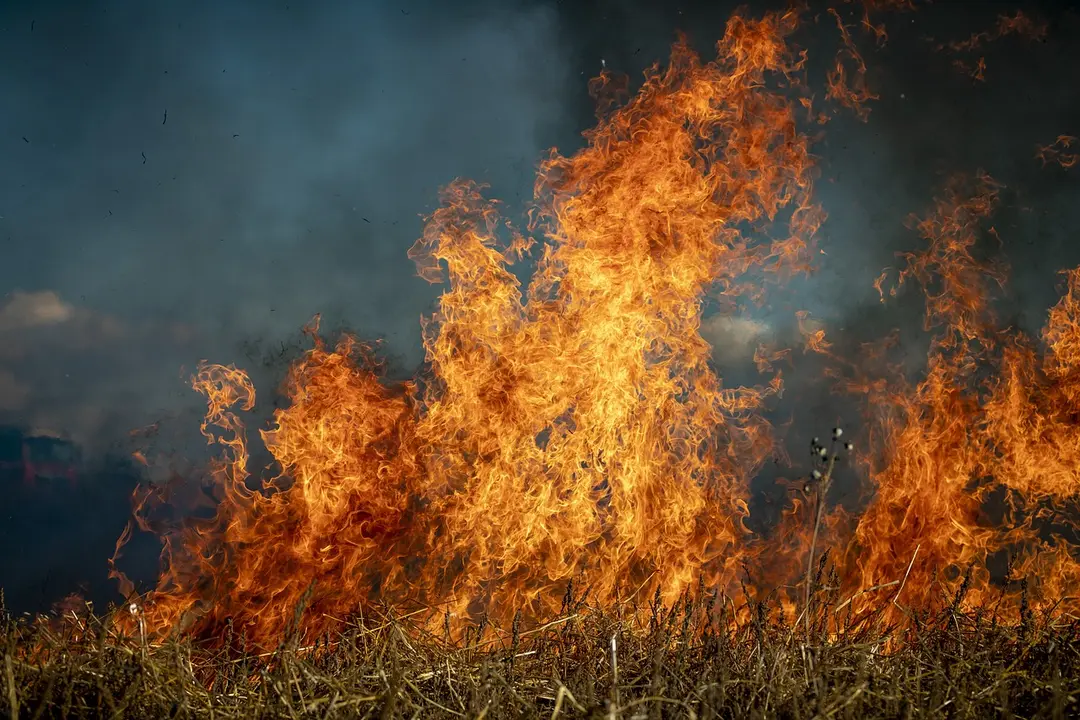Evacuaciones tras los incendios forestales que avanzan rápidamente cerca de Atenas (Grecia)
Los incendios forestales, que estallaron el domingo, hacen estragos cerca de la capital y los meteorólogos destacan la previsión de que se produzcan incendios forestales debido a las condiciones meteorológicas hasta el jueves de esta semana.

A unos 22 kilómetros de Atenas, los incendios se declararon el domingo por la tarde, hacia las 15:00 horas. Las autoridades informaron de que las llamas alcanzaron en algunos momentos más de 25 metros de altura. Para controlar las llamas están ayudando 670 bomberos y una gran proporción de voluntarios. Se han empleado más de 30 aviones y helicópteros lanzadores de agua.
Desde el domingo, el fuego no ha cesado en los alrededores del norte de Atenas debido a los fuertes vientos que propagan las llamas. Vassilis Vathrakogiannis, portavoz de los bomberos, afirma que los vientos alcanzan los 39-46 mph. El domingo, en Varnavas, el fuego quemó 100 km2 de terreno en 4 horas. Un vecino de Varnavas llamado Nikos Anagnostou describió el incendio como "incontrolable".
De ahí que se evacuaran zonas residenciales y hospitales. Se han evacuado más de una docena de zonas, entre ellas Varnavas, Maratón, Penteli y otros alrededores de Atenas, mientras el espeso humo cubría el cielo de la capital el domingo.
La policía anunció que había ayudado a evacuar a más de 250 personas. Además, el cuerpo de bomberos ha pedido a los residentes que escuchen y obedezcan las órdenes de evacuación de las autoridades porque algunos residentes se habían negado y posteriormente habían quedado atrapados en sus casas causando mayores problemas a los bomberos y haciéndoles arriesgar sus vidas. Los medios de comunicación locales anunciaron que dos bomberos resultaron heridos tras los rescates del incendio.
"Alerta roja" del Gobierno
El Ministro de Crisis Climática y Protección Civil, Vassilis Kikilias, describió el incendio como "un fuego excepcionalmente peligroso, contra el que llevamos luchando más de 20 horas en circunstancias dramáticas". Funcionarios gubernamentales y meteorólogos han decretado la "alerta roja" por riesgo de incendios forestales en la mitad de Grecia ante el aumento del riesgo por las previsiones meteorológicas para esta semana.
Temperaturas extremas en Grecia y cambio climático
Grecia está acostumbrada a condiciones climáticas calurosas y secas y a incendios forestales en sus meses de verano. Sin embargo, el cambio climático ha aumentado su intensidad. Los científicos sostienen que el impacto humano que espolea el cambio climático ha hecho que las olas de calor, que estamos presenciando en toda Europa, sean 2,5 grados más calurosas. El Dr. Lagouvardos, director de investigación del Observatorio Nacional de Atenas, destaca que "el Mediterráneo es un punto caliente de la crisis climática".
En junio y julio, Grecia ha registrado las temperaturas más altas de su historia. Este mes de julio se produjeron incendios forestales extremos en Rodas, una de las islas griegas. Las temperaturas alcanzaron los 45 grados y provocaron la evacuación de más de 20.000 personas, lo que supuso la mayor evacuación de Grecia por un incendio forestal hasta la fecha. El Primer Ministro griego, Kyriakos Mitsotakis, declaró que Grecia está "en guerra" contra los incendios forestales tras estos sucesos que afectaron a otras partes del país.
Los incendios forestales y las previsiones meteorológicas extremas son retos importantes a los que Grecia seguirá haciendo frente. En 2023, los incendios forestales causaron la muerte de más de 20 personas y quemaron un total de 174.773 hectáreas en todo el país. El incendio forestal de Evros del año pasado fue el mayor jamás registrado en la UE.
Las autoridades no han especificado cuántas viviendas han resultado dañadas, pero estos incendios forestales han reavivado el temor a que Grecia pueda vivir circunstancias peligrosas similares a las del año pasado.
---English version---
Evacuations following wildfires rapidly moving close to Athens (Greece)
Wildfires, which erupted on Sunday, are raging near the capital and meteorologists highlight the predicted prevalence of wildfires due to the weather conditions until Thursday this week
Approximately 22 miles from Athens, the fires broke out on Sunday afternoon around 3pm. Authorities reported that the flames reached more than 25 meters in height at times. In order to control the blaze, 670 firefighters and a large proportion of volunteers are helping. More than 30 water-dropping planes and helicopters have been employed.
Since Sunday, the fire has continued along the northern suburbs of Athens due to strong winds spreading the flames. Vassilis Vathrakogiannis, the fire brigade spokesman said that the winds were up to 39-46 mph. On Sunday in Varnavas, the fire burned 100 square km of land in 4 hours. A resident of Varnavas called Nikos Anagnostou described the fire as “uncontrollable”.
Hence, residential areas and hospitals were evacuated. Evacuations have taken place for more than a dozen areas including Varnavas, Marathon, Penteli and other suburbs of Athens as the thick smoke covered the sky in the capital city on Sunday.
The police department announced that it has helped evacuate more than 250 people away from the blaze. Additionally, the fire department has requested that residents listen and obey the evacuation orders from the authorities because some residents had refused and subsequently became trapped in their homes causing greater problems for firefighters and making them risk their lives. Local media announced that two firefighters were injured following the fire rescues.
“Red alert” from the government
Climate Crisis and Civil Protection Minister Vassilis Kikilias described the wildfires as “an exceptionally dangerous fire, which we have been fighting for more than 20 hours under dramatic circumstances”. A “red alert” for wildfire hazard has been issued for half of Greece by government officials and meteorologists given the increased risk from the weather forecast for this week.
Extreme temperatures in Greece and climate change
Greece is accustomed to hot and dry weather conditions and wildfires in its summer months. Yet, climate change has increased the intensity of them. Scientists argue that the human impact spurring climate change has made the heatwaves, which we are witnessing across Europe, 2.5 degrees hotter. Dr Lagouvardos, research director at the National Observatory of Athens, highlights that “the Mediterranean is a hot spot of the climate crisis”.
In June and July, Greece has seen its highest temperatures ever recorded. This July, there were extreme wildfires in Rhodes, one of Greece’s islands. Temperatures soared to 45 degrees and it resulted in more than 20,000 people evacuating which was Greece’s largest wildfire evacuation to date. The Greek Prime Minister Kyriakos Mitsotakis said that Greece is “at war” with wildfires following these events which affected other parts of Greece.
Wildfires and the extreme weather forecasts are significant challenges which Greece will continue to deal with. In 2023, wildfires killed more than 20 people and a total 174,773 hectares were burnt across the country. The Evros wildfire last year was the biggest which the EU has ever recorded.
It has not been specified by officials how many homes have been damaged but these wildfires have reignited fears that Greece could see dangerous circumstances similar to what it experienced last year.








